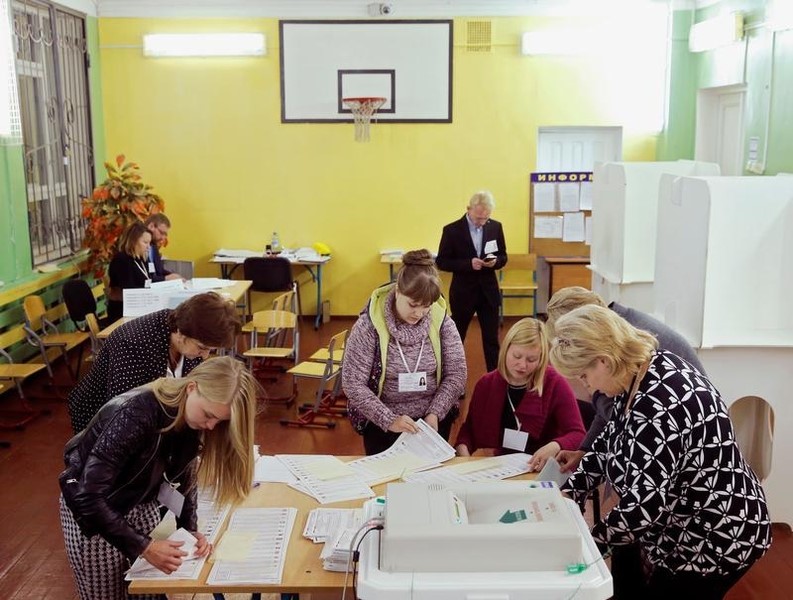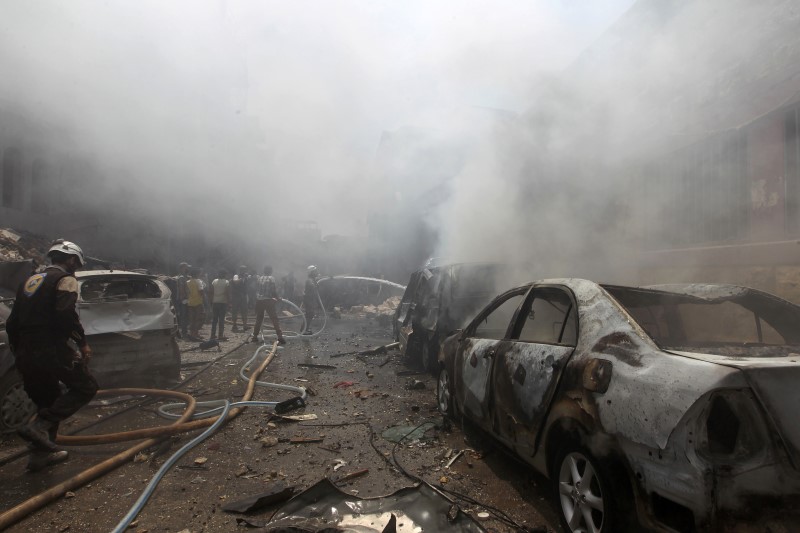
By Tom Perry and John Davison
BEIRUT (Reuters) – Air raids hit aid trucks near the city of Aleppo on Monday, a monitoring group reported, as the Syrian military declared that a week-long ceasefire was over.
The attacks were carried out by either Syrian or Russian aircraft, the Syrian Observatory for Human Rights said, adding that there had been 35 strikes in and around Aleppo since the truce ended.
The Observatory said the aid trucks had made a delivery organized by an international organization to an area west of Aleppo. The United Nations and Red Cross said they were investigating the reports.
A local resident told Reuters by phone that the trucks were hit by around five missile strikes while parked in a center belonging to the Syrian Red Crescent in the town of Urm al-Kubra, near Aleppo. The head of the center and several others were badly injured.
The monitoring group said it was not clear if the jets were Syrian or Russian. Moscow supports President Bashar al-Assad with its air force. The Syrian military could not immediately be reached for comment.
The air strikes appeared particularly heavy in insurgent-held areas west of Aleppo, near the rebel stronghold of Idlib province. And in eastern Aleppo, a resident reached by Reuters said there had been dozens of blasts.
“It started with an hour of extremely fierce bombing,” said Besher Hawi, the former spokesman for the opposition’s Aleppo city council. “Now I can hear the sound of helicopters overhead. The last two were barrel bombs,” he said, the sound of an explosion audible in the background.
Abu al-Baraa al-Hamawi, a rebel commander, said the most intense bombardments had taken in place in areas west of Aleppo, the same area where the aid convoy was hit. “The regime and Russians are taking revenge on all the areas,” he said.
The raids came as what is likely to be the final attempt by the U.S. administration of President Barack Obama to find a negotiated solution to the five year old civil war appeared close to collapse.
U.S. Secretary of State John Kerry said it was too early to call the ceasefire finished, and the United Nations said that only Washington and Moscow could declare it over, as they were the ones who had originally agreed it.
Washington said it was working to extend the truce but called on Russia to first clarify the Syrian army’s statement that it was over.
Russian and U.S. officials met in Geneva on Monday to try to extend the truce, and the International Syria Support Group – the countries backing the Syria peace process – was scheduled to meet on Tuesday in New York to assess the agreement.
But both the Syrian army and the rebels spoke of returning to the battlefield.
Syria’s army said the seven day truce period had ended. It accused “terrorist groups”, a term the government uses for all insurgents, of exploiting the calm to rearm while violating the ceasefire 300 times, and vowed to “continue fulfilling its national duties in fighting terrorism in order to bring back security and stability”.
Asked about the army’s statement, Kerry told reporters in New York that the seven days of calm and aid deliveries envisaged in the truce had not yet taken place.
“It would be good if they didn’t talk first to the press but if they talked to the people who are actually negotiating this,” Kerry said. “We just began today to see real movement of humanitarian goods, and let’s see where we are. We’re happy to have a conversation with them.”
Aid was delivered to the besieged town of Talbiseh in Homs province on Monday, the Red Cross said, for the first time since July. The convoy brought in food, water and hygiene supplies for up to 84,000 people, it said.
But most aid shipments envisioned under the truce have yet to go in, especially a convoy destined for rebel-held eastern parts of Aleppo, where some 275,000 civilians are believed trapped without access to food or medical supplies.
“I am pained and disappointed that a United Nations convoy has yet to cross into Syria from Turkey, and safely reach eastern Aleppo,” the U.N. Under Secretary General for Humanitarian Affairs Stephen O’Brien said in a statement.
The United Nations said it had received government approval to reach nearly all the besieged and hard-to-reach areas where it sought to bring aid, but access to many areas was still constrained by fighting, insecurity and administrative delays.
Already widely violated since it took effect, the ceasefire came under added strain at the weekend when Russia said jets from the U.S.-led coalition against Islamic State killed more than 60 Syrian soldiers in eastern Syria.
Assad called that incident “flagrant aggression”. Washington has called it a mistake.
KERRY’S GAMBLE
The ceasefire is the second negotiated by Washington and Moscow since Russia joined the war. But while it led to a significant reduction in fighting at the outset, violence has increased in recent days and aid has mostly failed to arrive.
Plans to evacuate several hundred rebels from the last opposition-held district of Homs city have also overshadowed the agreement, with rebels saying it would amount to the government declaring the ceasefire over. The Homs governor said the plan had been postponed from Monday to Tuesday.
An end to the truce could doom any chance of the Obama administration negotiating a Syria breakthrough before it leaves office in January. Kerry overcame scepticism of other administration officials to hammer out the deal, gambling on cooperation with Russia despite the deepest mistrust in decades between the Cold War-era superpower foes.
Washington and Moscow back opposite sides in the war between Assad’s government and the insurgents, while both oppose the Islamic State jihadist group. Russia joined the war a year ago on Assad’s side, tipping it firmly in his favor.
The politburo chief of one prominent Aleppo rebel group, Fastaqim, said the agreement had “practically failed and has ended”, adding that it remained to be seen if anything could be done “in theory” to save it.
Zakaria Malahifji, speaking to Reuters from the Turkish city of Gaziantep, also indicated rebel groups were preparing for combat: “I imagine in the near future there will be action by the factions”.
Monitors reported clashes in and around Aleppo on Monday. The government blamed some of the violence on what it said was an insurgent assault, but another rebel official denied they had yet launched new attacks.
The opposition High Negotiations Committee spokesman Riad Nassan Agha said the government side had never committed to the truce: “Air raids by Russian and Syrian warplanes, which haven’t stopped, suggest the truce never started in the first place.”
(Additional reporting by Nikolaj Skydsgaard in Copenhagen, John Davison, Lisa Barrington and Ellen Francis in Beirut, Lesley Wroughton in New York, Stephanie Nebehay and Tom Miles in Geneva; Writing by Tom Perry and Peter Graff; Editing by Giles Elgood)










